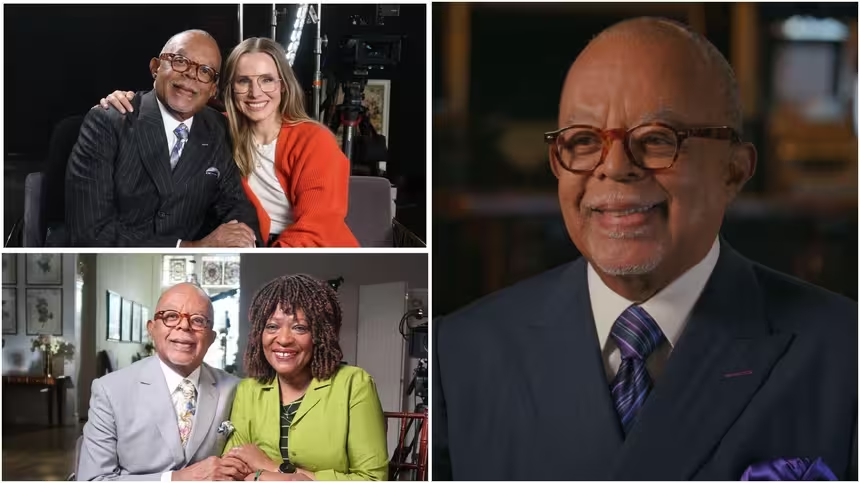Finding Your Roots
Tony Gonzalez' Ancestors' Incredible Reunion After Slavery
Clip: Season 9 Episode 6 | 6m 20sVideo has Closed Captions
Tony Gonzalez discovers his ancestors' remarkable reunion after separating during slavery.
Tony Gonzalez and Professor Henry Louis Gates, Jr. discover a story of family separation during slavery and a remarkable reunion. Gonzalez, is widely considered the greatest tight end in NFL history, and was inducted into the Pro Football Hall of Fame in 2019.
Problems playing video? | Closed Captioning Feedback
Problems playing video? | Closed Captioning Feedback
Corporate support for Season 11 of FINDING YOUR ROOTS WITH HENRY LOUIS GATES, JR. is provided by Gilead Sciences, Inc., Ancestry® and Johnson & Johnson. Major support is provided by...
Finding Your Roots
Tony Gonzalez' Ancestors' Incredible Reunion After Slavery
Clip: Season 9 Episode 6 | 6m 20sVideo has Closed Captions
Tony Gonzalez and Professor Henry Louis Gates, Jr. discover a story of family separation during slavery and a remarkable reunion. Gonzalez, is widely considered the greatest tight end in NFL history, and was inducted into the Pro Football Hall of Fame in 2019.
Problems playing video? | Closed Captioning Feedback
How to Watch Finding Your Roots
Finding Your Roots is available to stream on pbs.org and the free PBS App, available on iPhone, Apple TV, Android TV, Android smartphones, Amazon Fire TV, Amazon Fire Tablet, Roku, Samsung Smart TV, and Vizio.
Buy Now

Explore More Finding Your Roots
A new season of Finding Your Roots is premiering January 7th! Stream now past episodes and tune in to PBS on Tuesdays at 8/7 for all-new episodes as renowned scholar Dr. Henry Louis Gates, Jr. guides influential guests into their roots, uncovering deep secrets, hidden identities and lost ancestors.Providing Support for PBS.org
Learn Moreabout PBS online sponsorship-[Henry VO] Turning back to Tony Gonzalez, we had one more seemingly-impossible story to share.
Tony's third great-grandfather, George Betts, was likely born into slavery in Wilmington, North Carolina, some time around the year 1828.
Searching for traces of his life, we found something that every African-American hopes to find, but very few do.
-[Tony] "$50 Reward.
The above reward will be given for the apprehension and return to me of my Negro man George Betts, who run away on Wednesday evening last.
He is a tall mulatto, about 26 to 27 years of age, well known about town, a carpenter by trade, and was purchased by Mrs. Betts.
He is most probably lurking about town."
-Tony, your third great-grandfather ran away.
-Mm!
-[Henry] He escaped from his enslaver.
-Damn right he did!
-[Henry] What's it like to see that?
You know, we all know that-- you've heard about the Underground Railroad.
-Uh-huh.
-And we know that some enslaved people ran away, but there's actual proof that your ancestor, listed by name, actually ran away.
-[laughs] That doesn't surprise me; my family, they don't like authority too much.
We, we!
I'm with it too.
Can't tell me anything.
That's good.
-[Henry VO] At the time of his escape, George had at least three children with a woman named Polly.
Polly is Tony's third great-grandmother, and we believe that George likely ran away because his owner was trying to sell him, and thus separate him from Polly and their family.
But whatever his reasons, George's plan did not succeed.
-[Tony] "I hereby notify the public that the outlawry against my boy George Betts is hereby recalled."
-[Henry] Mm-hm, that means he was caught.
-Oh!
Okay.
-It means "You don't have to look for him anymore 'cause we found him and he's home."
-Okay.
-[Henry] So now comes his punishment.
What do you think happened to him?
-I don't even want to know.
-[chuckles] -I hope for his sake is wasn't bad!
We'll see.
Maybe they sold him down anyway, I don't know.
-Well, let's find out.
-[Tony] Mm-hm.
-Please turn the page.
Tony, the record you're looking at is dated January 15th, 1855, four days after the notice you just read about George's capture.
Would you please read the transcribed portion?
-"I, William A. Berry, have sold and delivered unto the said Joshua G. Wright a certain Negro slave named George, a carpenter by trade."
So he sold him.
-[Henry] He sold him.
Your third great-grandfather ended up being sold away from the woman he loved and the three children he fathered.
Can you imagine?
-Yeah, tough.
-[Henry] Mm-hm.
-Tough.
The reality of a lot of... of a lot of slaves.
-[Henry] Yeah.
-Yeah.
-[Henry VO] George was sold to a man named Joshua G. Wright.
Fortunately, Wright lived in Wilmington, so George was not far from his family.
We don't know, however, if they were able to see each other.
In fact, we know nothing specific about George's experience with Wright.
But as we dug through the records that Wright left behind, we found something to help Tony imagine what his ancestor endured.
-[Henry] Please turn the page.
Wanna know who that is?
-Uh... [sighs] do I wanna know who this is?
[both chuckle] Who is that?
-That is the white man who owned your ancestor.
-[groans] -[Henry] That is Joshua G. Wright.
He is the man who bought your ancestor George when he ran away.
-Yeah.
-George would have seen that man every day, and every day, he would have known that that man had the power to sell him further away from his wife and three children at his whim.
-Mm-hm.
Yeah.
-[Henry] What do you feel when you look at that?
-You know, at first-- you go in waves.
The first thing you wanna react is, like, anger and go, "Screw this guy, F him," you know?
But then, you think, "Andrew Jackson, presidents..." -Mm-hm, George Washington.
-"George Wa-- people in political power, leaders of our nation.
This was normal."
-Mm-hm.
-This was just-- it just is what it is.
-[Henry] Mm-hm.
-And so...
I think to myself, "This guy didn't know any better.
He was just doing the norm.
This is what everybody did; everybody had slaves."
It's not like he said, "Oh, I'm gonna do something awful," awful was the norm.
-Right.
-And so I'm not gonna get too emotional with anger or sadness because of this... ignorant man.
I'm not gonna call him-- he didn't know.
-[Henry] Mm-hm.
-So that's the way I look at all... ignorance, whether it's going on today or back then; a lot of these people, they don't know.
His dad-- who knows how he was raised... -Mm-hm.
-[Tony] And what he was told.
Racism, to this day, it's learned.
Little kids aren't racist.
-[Henry] Mm-hm.
-[chuckling] Go spend some time with some kids at a school in kindergarten; they're not racist.
That's learned.
And so this fool [chuckles] learned this from his parents.
-[Henry VO] Despite the system that so abused them, Tony's ancestors forged a bond that could not be severed.
In 1866, just a year after the Civil War, George and Polly appear on what was known as a "cohabitation record," formalizing a decades-long relationship that had not been legally recognized under slavery.
-So Tony, what it means is as soon as your ancestors were free, they got married, in effect.
-Yeah, cool.
-Isn't that amazing?
-Yeah, good for them.
I love how... they were together for that long, and then as soon as they get the chance to make it legal, they do it.
-[Henry] Mm-hm.
-I think that speaks to who they were as a people.
Family: Lost and Found Preview
Video has Closed Captions
Preview: S9 Ep6 | 32s | Joe Manganiello and Tony Gonzalez discover close relatives whose names they’ve never heard (32s)
Joe Manganiello's Great-Grandmother Escaped Genocide
Video has Closed Captions
Clip: S9 Ep6 | 4m 27s | Joe Manganiello says his maternal great-grandmother survived the Armenian Genocide. (4m 27s)
Providing Support for PBS.org
Learn Moreabout PBS online sponsorship

- History
Great Migrations: A People on The Move
Great Migrations explores how a series of Black migrations have shaped America.












Support for PBS provided by:









